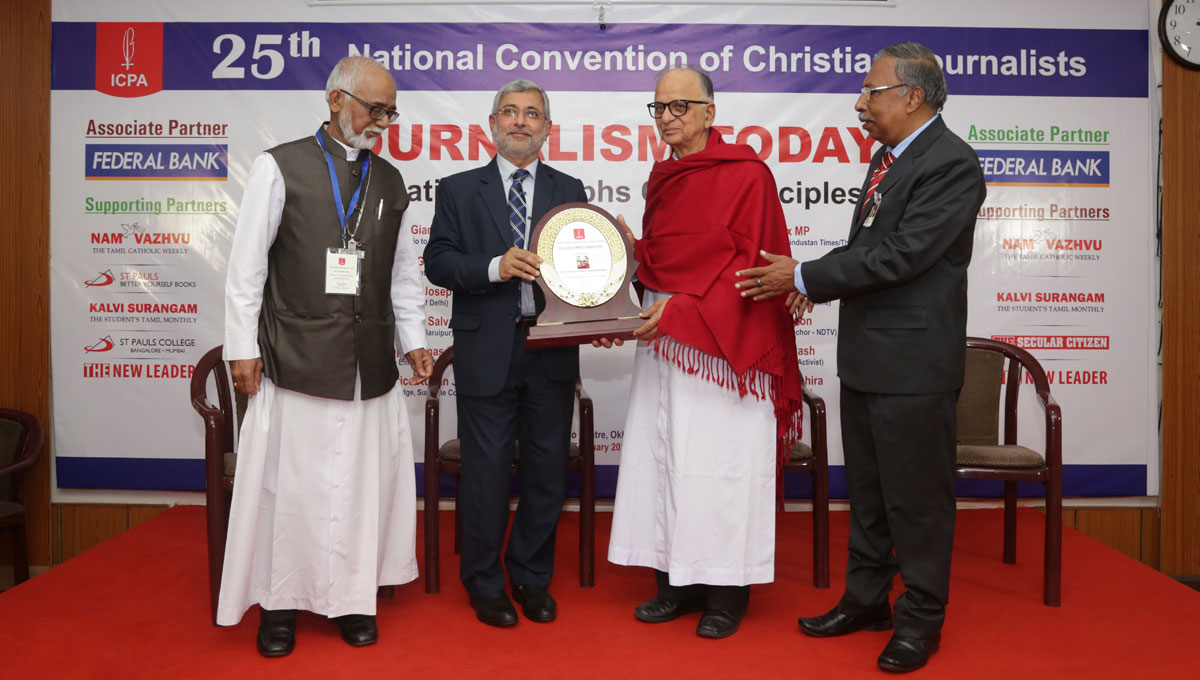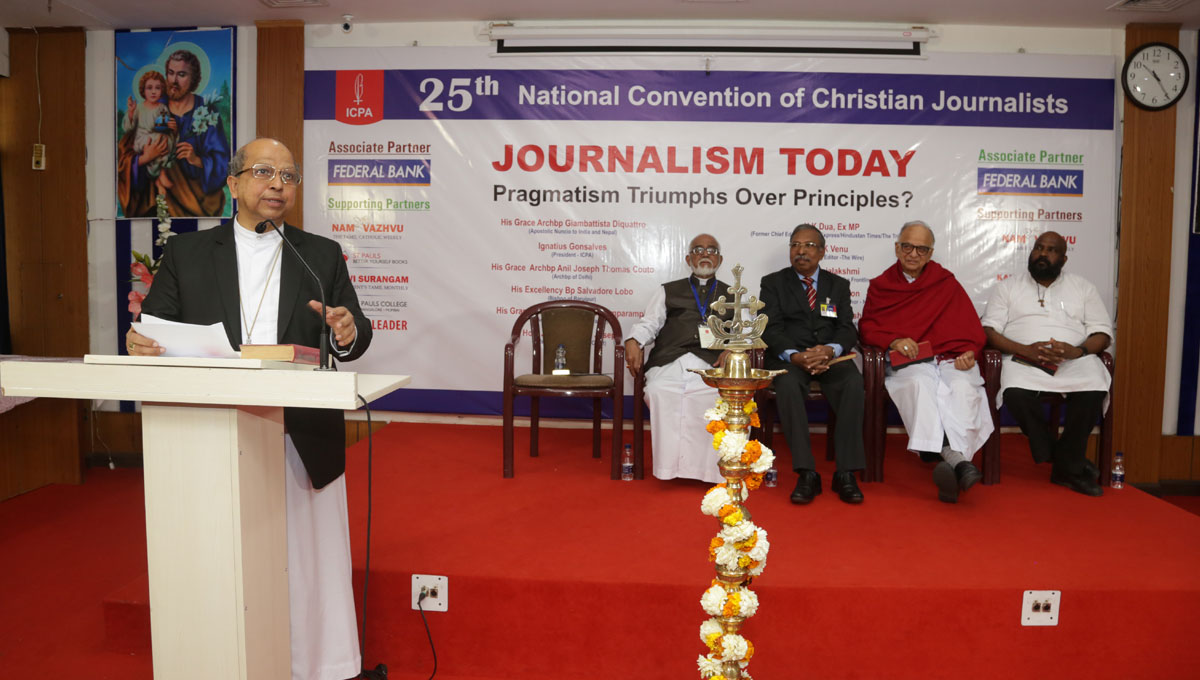Journalism Today: Pragmatism triumphs over principles?
Archbishop Anil Couto - March 2020

It was Thomas Jefferson who said that if he were to choose between a government without the Press and Press without government, he would choose the latter.
The topic of the day "Journalism today: Pragmatism triumphs over principles?" gains more relevance in the Indian context where watchdogs have been accused of becoming lapdogs.
Another American journalist and investigative reporter Wayne Barrett once described journalism as the only profession where you get paid to tell the truth. He did not, however, explain the cost journalists have to pay for telling the truth. Since Barrett passed away recently, there’s no way one can ask him.
But we get the answer from writers and journalists like Perumal Murugan, G Bala, Prannoy Roy,or from the lives of journalist Gauri Lankesh, Leftist thinker Govind Pansare, rationalist Narendra Dabholkar and Kannada scholar M.M. Kalburgi who were snuffed out allegedly by fascist forces.
The role of media is to inform truth and nothing but truth. But truth has become the biggest casualty in the last few years. Journalists, instead of exposing the government's failures, are busy mouthing the latter's version without questions being raised on the veracity of the claims. It is almost as if they are being paid to advertise what a wonderful government we have. Suddenly, all government schemes look good. Interviews are scripted to have politically right and safe questions.
The media seems to go after opposition parties and leaders, forgetting its prime duty of keeping the government under its radar. Compare this with what then Prime Minister Jawaharlal Nehru told distinguished cartoonist Shankar during the inauguration of Shankar's Weekly: 'Don't spare me'.
With a few exceptions, the media is swallowing propaganda and peddling it as news. In the process, the media has forgotten a sacred axiom: Truth is what someone somewhere wants to hide; the rest is all advertising.
TV channels and newspapers, with some exceptions, have become cheerleaders of the ruling party and its leaders. Instead of truthful, balanced and objective reporting, people are fed with what the government wants them to read, hear and believe.
When was the last time the media had a free-wheeling interview with the Prime Minister? When was it that the media got a chance to ask searing questions to the top executive head of the State on a wide-range of issues that beg for answer? How many journalists do follow-up stories, a sine qua non of independent Press, on the much-touted government schemes and programs, which are frequently announced? Does the media try to find out the genuineness of the figures put out by the government?
It was during the US invasion of Iraq that the usage 'embedded journalism' became a byword. It meant attaching of journalists to military persons so that the former will have a better access to war news. However, it meant disseminating news which the government wanted people to know. The best example was the propaganda of falsehood that Iraq under Saddam Hussein was in possession of biological weapons. But one should not forget that the same media has not buckled under the pressure of President Donald Trump, despite being 'trampled upon' by the might of the US government.
It will not be exaggerating if someone coins a phrase 'government-embedded journalists' for the Indian media. They have stopped questioning, investigating, and analyzing what is handed out to them. They work as if an unforeseen force is controlling their hands and tongues.
After the Pulwama attack by terrorists and the bombing of Balakot hide-out of JeM terrorists by Indian Air Force, many media organizations had become 'war rooms' rather than news rooms. As journalists wore army uniforms and embarked on round-the-clock war-mongering, people watched helplessly the unfolding of drama rather than uncovering of truth.
The government's veiled threats and financial squeeze on the media houses owning television channels has worked well; most of the popular channels are now reverent to the government and hostile to the small opposition.
Television debates often end up promoting the government agenda than highlighting issues that matter to the people most. Television anchors with high rating and decibels have given up the pretense of being custodians of public interests as they roll out debates in support of the government policies. Only a few are around to stand with the truth.
There may be two reasons for the news media coming down to this level: Either there is widespread fear of the government's vindictive attitude or there is little difference between the agenda of the government and those running media companies. Whatever be the truth, this is the time for soul searching so that the respect the Indian media enjoys at the world stage does not become a thing of the past.

The 'World Press Freedom Index 2019' ranked India at 140 out of 180 countries stating, "Violence against journalists including police violence, attacks by Maoist fighters and reprisals by criminal groups or corrupt politicians is one of the most striking characteristics of the current state of press freedom in India."
At least six Indian journalists were killed in connection with their work in 2018. Doubts surround a seventh case, the Index noted. In reference to India, it found an alarming increase in hate campaigns waged on social networks against journalists who dare to speak or write on subjects that annoy Hindutva forces.
Mark Twain said, "Get your facts first, then you can distort them as you please." Unfortunately, now people end up getting no facts, but only distorted facts. Free expression of ideas, in whichever form, unless it goes against the provisions of the Constitution, is no crime; rather it is a fundamental right and a proof of vibrant democracy.
Constructive criticism is no wrong-doing; silencing it merely because it goes against the interests of the government and certain sections is tantamount to despotism. Bringing out the rot in the system is no offence; but, bidding to sweep it under the carpet is illegal. Singing paeans to powers-that-be is not the duty of writers and journalists; holding a mirror to them is the task of responsible journalism.
Lokmanya Bal Gangadhar Tilak once wrote that his objective in running Kesari was to make the rulers know about the aspirations and the agonies of the ruled and to make the ruled feel more fearless. The objective put forth by Tilak remains relevant today. The future of the Fourth Estate lies not in edifying nonsense but in nurturing many more Tilaks. The good governance that Prime Minister Narendra Modi shouted from rooftops will come about only if it is met with fearless journalism.
The 2004 general assembly of the CBCI held in Thrissur came out with a pathbreaking statement: "Media have a prophetic role, indeed a vocation: To speak against the false gods and ideals of the day, materialism, hedonism, consumerism and narrow nationalism."
As Christian journalists, you have a sacred duty to raise your voice against evils in the society and in the Church. You have a duty to highlight the impoverishment of millions of Indians, suicides by farmers, politics of hate, rampant corruption, violence against Dalits, minorities, women, and the marginalized. You must be visible and vocal when the Church fails in her sacred duty.
The Church also should have the sagacity to read or listen to 'unfavorable and unpleasant' news about her. Ultimately it might help. Remember, today's journalists are yesterday's prophets. I wish courage for you to become John the Baptist of the day.
(The head of the Catholic archdiocese based in the national capital presented this paper at the 25th National Convention of Christian Journalists on February 29 organized by the Indian Catholic Press Association at the Don Bosco Provincial House, Okhla, Delhi.).
Send your feedback to : onlinekeralacatholic@gmail.com